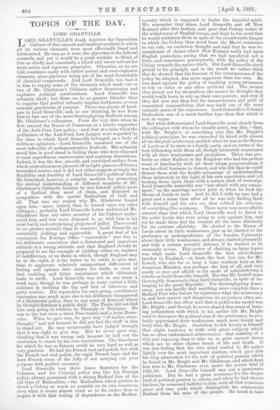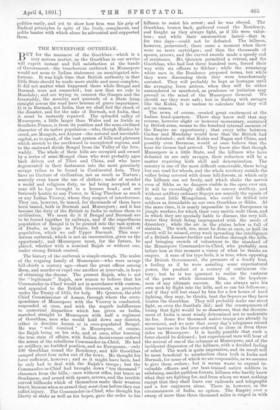TOPICS OF THE DAY.
LORD GRANVILLE. TIORD GRANVILLE'S death deprives the Opposition Cabinet of that smooth and lambent medium in which all its various elements were most effectually fused and harmonised. He was, as it were, the glycerine in the Liberal counsels, and yet it would be a great mistake to think of him as chiefly and essentially a bland and sweet solvent for more active and vigorous principles. Glycerine, as we are told, combines easily with rather potent and even explosive elements, nitro-glycerine being one of the most formidable of chemical compounds. And Lord Granville, too, had it in him to supply some of the elements which made one or two of Mr. Gladstone's Cabinets rather threatening and explosive political combinations. Lord Granville was urbanity itself ; but there can be no greater blunder than to suppose that perfect urbanity implies feebleness, or even extreme gentleness of purpose. There was plenty of hard- pan in Lord Granville, and, to our thinking, he was from first to last one of the most thoroughgoing Radicals among Mr. Gladstone's colleagues. From the very date when he first entered the House of Commons as a hearty supporter of the Anti-Corn Law policy,—and that at a time when the politicians of the Anti-Corn Law League were regarded by the class to which Lord Granville belonged, as a body of seditious agitators,—Lord Granville remained one of the most inflexible of undemonstrative Radicals. His urbanity stood him in good stead in foiling those who were disposed to raise superfluous controversies and captious discussions. Indeed, it was the fine, smooth, and varnished surface from which contentiousness glanced off as light glances off from a burnished mirror, and it did not either suggest or imply the flexibility and ductility of Lord Granville's political mind. He furnished, however, a suitable medium for promoting the mutual understanding of different members of Mr. Gladstone's Cabinets, because he was himself rather more of a Radical than most of them, and disposed to sympathise with the special Radicalism of each and all. That was one reason why Mr. Gladstone leaned upon him,—more, indeed, than he leaned upon any other colleague ; probably Lord Granville better understood Mr. Gladstone than any other member of his Cabinet under- stood him, and was more disposed to go with him in his most hardy and enterprising projects of policy. There could be no greater mistake than to conceive Lord Granville as essentially yielding and squeezable. A great deal of his reputation for Foreign Office " surrenders " was due to his deliberate conviction that a dictatorial and imperious attitude is a wrong attitude, and that England should be prepared to set the example of yielding either on matters of indifference, or on those in which, though England may be in the right, it is far better to be ready to give way, than to aggravate relatively unimportant differences of feeling and opinion into causes for strife, or even of that rankling and bitter resentment which ultimately leads to strife. Lord Granville was not in any sense a weak man, though he was perhaps to some extent a little indolent in tackling the fag and fret of laborious and petty routine. His reputation for easy-going, conciliatory concession was much more due to his deliberate disapproval of a dictatorial policy, than to any want of firmness where he thought firmness a public duty. The Turks did not find him easy-going in relation to Thessaly or Dulcigno. He was to the last even a stern Free-trader and a keen Home- ruler. When he gave way, he gave way "of malice afore- thought," and not because he did not feel the stuff in him to stand out. He may occasionally have judged wrongly that it was right to give way. But he never gave way, thinking that it was wrong, only because he had not the resolution to stand by his own convictions. The blandness for which he was so famous could be very hard as well as very gracious. He had the French tact and polish, but with the French tact and polish, the rigid French logic and the keen French sense of the folly of not carrying out your purpose with perfect accuracy. Lord Granville was three times Secretary for the Colonies, and his Colonial policy was like his Foreign policy, always possessed with a strong Radical bias of the old type of Radicalism,—the Radicalism which prefers to throw a Colony as much as possible on its own resources, even when it seems almost cruel so to do, rather than to inspire it with that feeling of dependence on the Mother country which is supposed to foster the imperial spirit. We remember that when Lord Granville cast off New- Zealand after this fashion, and gave that Colony notice of the withdrawal of English troops, and kept to his word that he would withdraw them in spite of the considerable danger in which the Colony then stood from the Maori resistance to our rule, we ourselves thought and said that he was in- considerate of claims which New Zealand really had upon English protection, seeing that we had interfered not a little, and sometimes peremptorily, with the policy of the Colony towards the native chiefs. But Lord Granville stuck grimly to his principle, and in the result we rather think that he showed that his forecast of the consequences of the policy he adopted, was more sagacious than our own, He was dead against the policy of teaching young swimmers to rely on corks or any other artificial aid. The sooner they struck out for themselves, the sooner he thought they would really learn to rely on their own powers ; and even if they did now and then feel the inconvenience and peril of unassisted responsibility, that was itself one of the most valuable parts of the experience. Lord G-ranville's Colonial Radicalism was of a much hardier type than that which is now in vogue.
But what differentiated Lord G-ranville most clearly from the colleagues with whom he usually acted, was this,—that, with Mr. Bright's, or something very like Mr. Bright's political principles, he was connected by blood with almost all the English aristocracy, and felt when he was in the House of Lords as if he were in a family party, and on teruis of the best fellowship with them all, though intimately acquainted with all their weaknesses and prejudices. There was pro- bably no other Radical in the Kingdom who had his perfect sense of familiarity with all those whose prepossessions it was his chief business to thwart, and who felt that he could thwart them with the double advantage of understanding them intimately by the light of his own experience, and yet looking down upon them with a certain dash of contempt. Lord Granville assuredly was "not afraid with any amaze- ment," as the marriage service puts it, when he took the House of Lords to task. And he did it with an ease and a grace and a sense that after all he was only finding fault with himself and his own set, that robbed his criticism of everything like acrimony. There never was more affable censure than that which Lord Granville used to direct to the noble Lords who were going to vote against him, and yet he made them feel the censure all the more distinctly for its extreme affability. He chatted to the House of Lords about its little weaknesses, just as he chatted to the graduates or undergraduates of the London University about their little weaknesses, and always chatted pleasantly and with a certain scornful delicacy, if he wanted to be unusually severe. This power of chatting on large topics. was what made Lord Granville the best after-dinner speaker in England,—at least, the best but one, for Mr. Lowell, who was for so long a time resident here as the American Minister, was perhaps the best of all, and very nearly as easy and affable in his mode of administering a rebuke as Lord Granville himself. Nor was Mr. Lowell more thoroughly democratic than Lord Granville, in spite of be- longing to the great Republic. For thoroughgoing demo- cracy, you can hardly find anything more complete than a Radical Peer who knows by experience what the aristocracy is, and how narrow and dangerous its prejudices often are. Lord Granville has often said that in politics his model was Mr. Bright ; and though he never shared that sense of burn- ing indignation with which in his earlier life Mr. Bright used to denounce the political sins of the aristocracy, he pro- bably appreciated their weaknesses much more keenly and truly than Mr. Bright. Doubtless he felt keenly in himself that slight tendency to trifle with great subjects which has so often undermined aristocracies,—that inability of a. rich and enjoying class to take up in grim earnest issues which are to other classes issues of life and death. It was this feeling that his own mind tended to flit rather lightly over the most important matters, which gave him his deep admiration for the sort of political passion which he found in Mr. Bright and Mr. Gladstone, and which kept him true to Mr. Gladstone even under the severe trial of 1885-86. Lord Granville himself was not a passionate politician. But he had a great reverence for the deeper kind of political passion in others, and when he had chosen his hero, he remained faithful to him, with all that tenacious grace and easy pride which distinguish the aristocratic Radical from the man of the people. He loved to take politics easily, and yet to show how firm was his grip of Radical principles in spite of the lively, complacent, and polite banter with which alone he advocated and supported them.







































 Previous page
Previous page